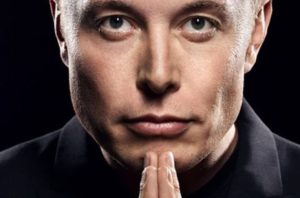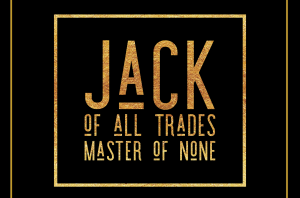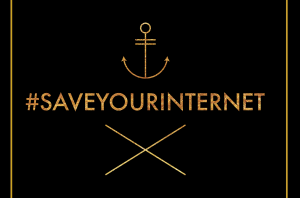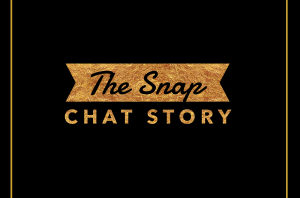He’s a dad from Wisconsin who drives a “piece of shit” Corolla. And his brilliantly absurd artwork has made him the face of a crypto market you didn’t know existed.
Beeple is an artist.
He makes digital art—pixels on screens depicting bizarre, hilarious, disturbing, and sometimes grotesque images. He smashes together pop culture, technology, and postapocalyptic terror into blistering commentaries on the way we live. A recent frame depicted Donald Trump wearing a leather mask and stripper’s pasties, taking a whip to the coronavirus bug (title: “Trump Dominating Covid”). On the day Jeff Bezos announced he was kicking himself upstairs, Beeple imagined the Amazon founder as a massive, threatening octopus emerging from the ocean as military helicopters circled above (“Release the Bezos”).
Beeple has 2.5 million Instagram followers. His work has been shown at two Super Bowl halftime shows and at least one Justin Bieber concert, but he has no gallery representation or foothold in the traditional art world.
And yet in December the first extensive auction of his art grossed $3.5 million in a single weekend.
That money? It went to one Mike Winkelmann, thirty-nine, father of two, husband of a schoolteacher, resident of a Charleston, South Carolina, suburb, driver of a “fucking Toyota Corolla piece of shit.”
See, Beeple is Mike Winkelmann. Mike Winkelmann is Beeple. And in the weird worlds of high fashion, fine art, and cryptocurrency, it doesn’t get any weirder than this story.
Expectations for December’s auction were on the high side of earthbound. That Saturday afternoon, Winkelmann—who looks like a young Bill Gates dressed in Steve Kornacki cosplay and speaks with a Wisconsin accent straight out of an old SNL sketch—and his wife, Jen, went to his brother’s backyard to monitor the auction. Pretty quickly, his brother, a former electrical engineer for Boeing, was scrawling sales figures on a whiteboard while the kids ran around the firepit, oblivious to the fact that every half hour another piece of Beeple’s digital art was selling for more than $100,000.
Jen was in a state of disbelief.
The artist himself couldn’t bear to watch, and mostly spent his time tweeting out photos of the next pieces and answering questions from would-be buyers. At one point, he received a direct message from the musician Sean Lennon—son of John—who tweeted: “I can’t manage to do anything today but watch these mfing @beeple auctions tick down,” adding: “god damn Beeple Mania have mercy.”
Ten pieces sold that day, and another eleven on Sunday, including the grand finale: one long, continuous digital loop of every single piece auctioned off that weekend. A stunning bid came in with one second remaining on the clock. “The Complete MF Collection,” as Beeple dubbed the work, sold for $777,777.
It was one of those things you hear about and think, Do I have any idea what’s going on in the world? Is this normal and I’m just waaaayy out of touch, baking my bread while people are out there buying digital artwork using cryptocurrency?
From Beeple?
Back up.
What, pray tell, are these collectors even buying? Why would someone pay $777,777 for an MP4? Couldn’t you watch that on Instagram for free?
Theoretically, yes, but the crypto art scene uses blockchain technology to authenticate and identify a single, unique piece of digital art. To understand how that piece of art sells for the price of a one-bedroom apartment in Brooklyn, one needs a brief primer on something called nonfungible tokens, or NFTs—digital goods that are bought and sold on emerging websites like Nifty Gateway, which hosted the Beeple auction. Nifty Gateway was founded in 2018 by the absurdly named Duncan Cock Foster, twenty-six, and his twin brother, Griffin. When asked to explain NFTs, Duncan used this analogy: Imagine you owned a pair of expensive Air Jordans. If Nike went out of business, those sneakers wouldn’t suddenly disappear from your closet. Why should digital goods—like a Fortnite skin or an original Beeple—be any different?
It was one of those things you hear about and think, Do I have any idea what’s going on in the world?
And so: Nifty Gateway—one of several upstart online marketplaces in a field that also includes sites called MakersPlace and SuperRare—mints a unique NFT, assigns it to a piece of digital art, and stores it forever in that company’s custodian wallet. Anyone with an Internet connection can log on and see who owns that piece.
Nifty Gateway was acquired in late 2019 by a more famous set of twins, Cameron and Tyler Winklevoss, best known as the guys who said Mark Zuckerberg stole their idea for Facebook. The Winklevii rode the cryptocurrency wave to the Bloomberg Billionaires Index and are bullish on NFTs. They ask why collecting digital art should be any different from collecting rare baseball cards. An item is worth what the market will pay.
The fact that you can’t hang the art on the wall is beside the point, they contend. “Physicality is a bug, not a feature,” says Tyler. “There was no scarcity in ones and zeroes until you enter with the blockchain.”
Put another way: Anyone can view a Beeple on Instagram. But blockchain makes it collectible.
Duncan Cock Foster—that’s seriously the family name—and his brother had launched Nifty Gateway with the hope of mainstreaming the market for NFTs, which had been complicated to buy and sell. (Most marketplaces required users to have Ethereum wallets.) For the December auction of Beeple’s work, they’d hoped to generate $500,000 in sales for the weekend. But when they crushed that number on Friday night, things started to get interesting. Cock Foster had been monitoring the proceedings from his apartment in New York’s Chinatown and was stunned—by the total figures but also by what this drop meant for the crypto scene. “We all felt like we were witnessing history,” he says. “This is one of the things, in retrospect, where people will say: How did we miss this?”
DISCLAIMER: Please be advised that nothing in this video shall be construed to be financial, legal or tax advice. The content of this video is solely the opinions of the speaker who is not a licensed financial advisor. All personal opinion is intended for general information purposes only.
By Esquire






